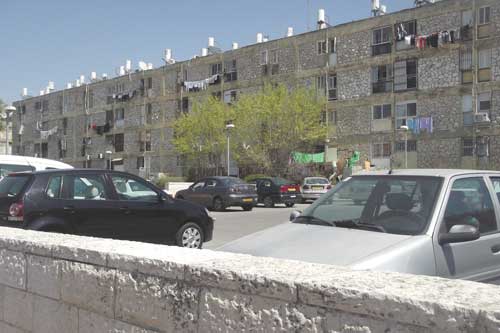.jpg)
.jpg)
The Challenge
My client wanted to buy a 3-bedroom apartment within a ten minute walk of Emek Refaim, but didn’t have the budget to afford atraditional apartment in Katamon or the German Colony.
The Solution
Although she was adamant about location and budget, my client was flexible on other issues, so we had room to get creative.
First, she was not afraid of buying an apartment in a non-elevator building. Second, although a sukkah balcony was preferable, it was not crucial. And third—and most significant—she was willing to purchase an apartment in a “shikun” building, which tends to sell for 20% to 30% below traditional apartment buildings.
Background
During the 1950s and 1960s, the Misrad Hashikun (Ministry of Housing) built numerous public housing projects, or “shikunim,” for new immigrants and government employees. Shikun buildings are located in many central Jerusalem communities, and are easily identifiable with their flat roofs and stucco facades. Over the years, many shikun buildings have been renovated and expanded; nevertheless most buyers shun purchasing these apartments due to the buildings’ lack of curb appeal.
Opportunity
My client embraced the concept of buying in a shikun building. She understood that in addition to getting the most bang for your buck, these apartments can be a good investment for the following reason: well-located shikun buildings have the potential to be torn down and rebuilt through various urban renewal projects, including the “pinuy binuy” (evacuation and construction) program.
Many shikun building sare situated in neighborhoods that over the years have gentrified and are now considered prime locations. Because these buildings are only three or four stories tall, they tend to have unused development rights. Consequently, there is a good possibility that a developer will cut a deal with the apartment owners to knock down the existing building and develop a much larger building. In return, each apartment owner will receive a larger apartment in a modern apartment building which boasts a lobby, elevator, underground parking, mamads (reinforced security rooms) and other valuable features. In layman’s terms, this is somewhat akin to trading in your old compact Chevy for a luxurious new executive-sized Lexus.
The “pinuy binuy” program has become a popular trend in Israel’s population centers as it is a win-win-win program for everyone: (1) the apartment owners, who receive new, large and attractive apartments, (2) the developers,who profit by selling apartments that were built utilizing the previously unused development rights, and (3) the local authorities, as the program provides a solution to the tremendous demand for housing, plus the shikun eyesores are being replaced with attractive modern buildings.
Tempering Expectations
Although this program sounds enticing, one should be aware that (1) not all shikun buildings will be torn down and rebuilt, and (2) even when these buildings are redeveloped, the “pinuy binuy” program is a drawn-out process which can take upwards of ten years to complete. Nevertheless, for a family that is comfortable living in a shikun building and has a long-term real estate horizon, buying an apartment that has “pinuy binuy” potential can be a golden opportunity.
Gedaliah Borvick is the founder of My Israel Home, a real estate agency focused on helping people from abroad buy and sell homes in Israel. To sign up for his monthly market updates, contact him at gborvick_gmail.com. Please visit his blog at www.myisraelhome.com.
By Gedaliah Borvick










